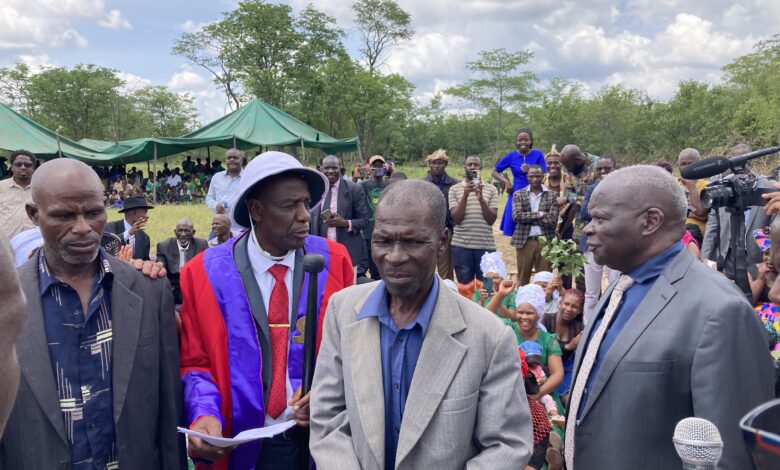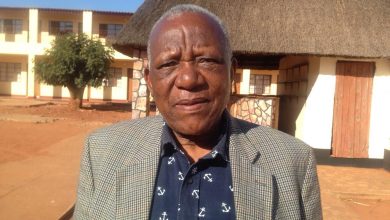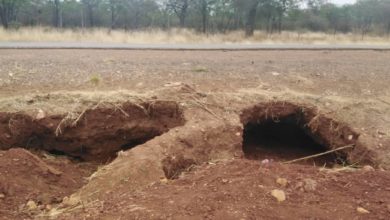Chief Menyezwa of Lupane finally installed

Meluleki Gumede was officially installed as Chief Menyezwa of Lupane in Matabeleland North on Thursday, following a protracted succession squabble that lasted nearly ten years.
Chief Johnson Menyezwa Gumede, passed away in 2013 and the chieftaincy was vacant since then.
The Gumede family was divided, as some members claimed Meluleki, born on April 14, 1972, was the late Chief’s child by a different woman, and that government representatives were interfering by pushing for his appointment while they were gunning for Sandras, whose mother, Judith, was married to the late Chief.
Sandras was born on January 9, 1994.
Speaking at the installation ceremony at Chief Menyezwa’s homestead in Dongamuzi Ward 1 in Lupane,, Deputy President of the National Chiefs Council, Senator Chief Mtshane Khumalo, admitted that Meluleki’s appointment had been a difficult decision.
“It was not easy. As Matabeleland North province, we sent a chiefs delegation three times with no resolution coming out. It was not easy,” he said.
“I hope despite that difficulty, you managed to come out with the chief that you wanted.”
Chief Mtshane advised the new chief to work with everyone, foes and friends alike, because unity was critical to development.
“When one emerges chief after a wrangle, it’s not easy because you will have more enemies than friends but if you follow that line of thought, you will be lost. Humble yourself, not everyone will love you. As a leader, even if you have enemies, treat them equally as those you love, it’s not an easy job. If you say, ‘I will fix them’ your job will be harder,” he said.
He also advised him to work well with headmen and village heads.
“You can’t work alone, work with these structures and your people because they will also treat you in the manner that you treat them,” Chief Mtshane said.
“You are no longer a young man as you will walk with elderly people and a chief even when they are 18 years old, they become an elder to the community.”
Family representative, Mxolisi Gumede, narrated the Menyezwa chieftainship could be traced back to KwaZulu Natal in South Africa where Chief Mazwi fled with the Ndebele nation founder King Mzilikazi.
“Mazwi had soldiers called Inqaba Yamadoda. In Rhodesia at that time, he and Mzilikazi established themselves in Old Bulawayo, places such as Rangemore and Hyde Park belonged to Mazwi. Mazwi had seven wives and when he died, Menyezwa took over,” he said.
Gumede said Menyezwa left Old Bulawayo after white settlers came in.
“He went to Makorokoro but the land was small, went to Mashonaland but he had many people, then went to Gwayi in Makhuyana. Some of his people stayed there. Settlers had promised Menyezwa some land but it had tsetse flies and when they controlled them, Menyezwa settled here in 1968, having arrived in Gwayi in 1967. He died in 1975,” he said.
After his death, Menyezwa’s sons asked their uncle Kongo Gumede to become chief and after his death, the chieftainship reverted back to Menyezwa’s children.
“Benja passed the chieftainship to his young brother Johnson in 1991 and died in 2013,” he said.
“We then asked Moses to hold the position. We had differences but eventually agreed to choose Melulueki. Even when Johnson died, Meluleki is the one who took his father’s stick. Today formalises his appointment.”
Local Government and Public Works Minister, July Moyo, who presided over the proceedings, said he was aware of the protracted succession squabble, which lasted nearly nine years because the family could not agree on a successor.
“I am delighted the Menyezwa clan has finally managed to resolve the dispute and witness the installation,” he said.
The installation ceremony follows the appointment done by president Emmerson Mnangagwa on December 6, 2022.
“The president is the one who appoints chieftainships in this country but that process starts in the households so the Gumede’s have chosen their chief. All the structures, Provincial Assembly of Chiefs, the National Chiefs Council, the ministry of local government facilitate so they can appoint persons selected by family,” Moyo said.
“He becomes a chief in Zimbabwe, not just in Lupane or Matabeleland North but in the whole of Zimbabwe.”
The local government minister said Chief Menyezwa was born a “natural leader” as at school he was a head boy and wherever he worked was a leader.
Chief Menyezwa is married to one wife and has four children, one boy and three girls.
He did his primary schooling at Mhlangeni in Bubi and secondary at Zwelabo, where he completed his O’Levels, moving to Speciss College where he studied graphic designing.
The chief once worked at the District Development Fund as a clerk, then in Victoria Falls as a head chef.
Currently, he is a beverage merchandiser for Pepsi Zimbabwe.
The local government minister said chieftainships in Zimbabwe tell the country’s history, noting that origins of the Menyezwa can be traced from King Tshaka to the leadership of President Mnangagwa.
“The history of this country is of people who have moved from all over Africa to Zimbabwe, whether they came first or last, we all moved together to Zimbabwe. Matabeleland North has the first people who came into this country, the Tswao or San, found in Tsholotsho or in Bulilima,” Moyo said.
He added that the first missionary station in Zimbabwe was established in 1859 in Matabeleland North, “before the invasion of the country.”
“These records must be kept because they shall guide us in many respects of tradition and history. The District Development Coordinator and traditional leader must tell every child under this chieftaincy, this history so they understand. We expect too many things to happen here in Lupane,” Moyo said.






